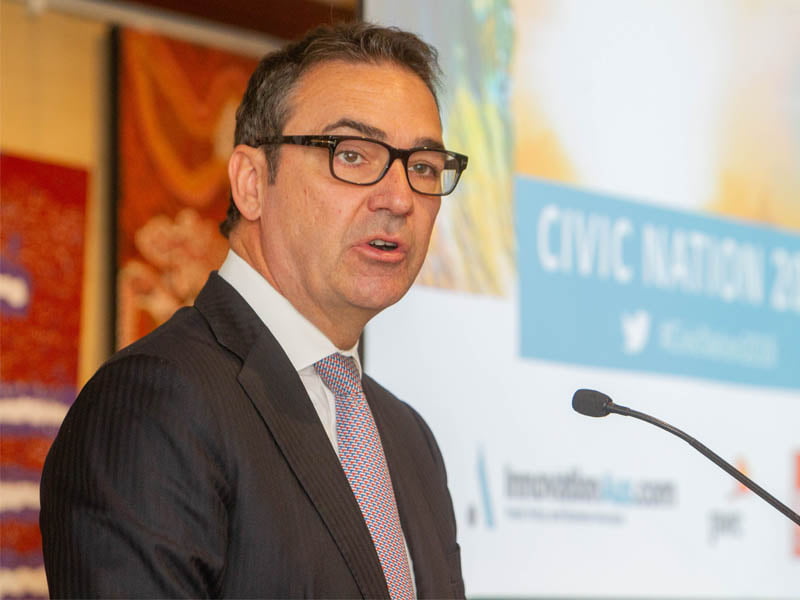South Australian Premier Steven Marshall says his government is working to an economic plan that aims to ensure the state exits 2020 in a stronger position than when it entered this problematic year.
The plan has some new elements, but mainly the state is simply doubling down on its existing efforts to build an environment in South Australia that is attractive to businesses and to individual talent to work and live.
While being respectful of the state’s “traditional industries” in mining, agriculture, manufacturing and construction, Premier Marshall says the state has one eye on future industries in defence, cyber, blockchain, AgTech, space, and the creative industries as drivers of jobs growth.
“2020 has been a tough year for us in South Australia. It started of course with that devastating bushfire and very soon thereafter we were in the midst of this COVID-19 pandemic,” Mr Marshall said.

“We made a decision very early on within the Cabinet that we were not going to just limp across the line or just survive 2020, [that] in fact we wanted to come out stronger than before,” he said. “And that has become like a mantra for this government: We want to look for opportunities.”
Mr Marshall was speaking exclusively to InnovationAus as part of its Reconstruction series that is looking at policies to drive the post-COVID economy.
The changed business practices of the global workforce, together with the changed attitudes to global supply chains was a huge opportunity for the Adelaide and the rest of the state.
Steven Marshall does not need any encouragement to make the point that Adelaide is consistently rated as one of the “most liveable” cities in the world. He points to relatively easy access to a skilled labour force (with better rates of churn) and a generally lower cost business environment.
Adding to this, the government response to COVID across Australia generally and the relatively tiny rates of infections in South Australia in particular – he says there is a huge opportunity to attract business investment and individual talent on the back of this.
“Plenty of people have realised that they don’t have to be sitting on the 68th floor of a building in the Sydney CBD – or in Hong Kong, or New York or London – and that they could be in Adelaide or some other rural or regional part of South Australia,” Mr Marshall said.
“This presents us with some unique opportunities in South Australia.”
The state had put together its business case for attracting businesses to the South Australia and had started a campaign late last year and early this year. Rather than putting that campaign on hold as a result of COVID, it has been ramped up.
“Companies that have been outsourcing work overseas are now looking to near-source options, and South Australia is a lower cost environment. But we marry up that lower cost with an environment that is very much focused on future industries.”
The crisis has had a transformational impact on citizens attitudes to government, and to government’s own risk management practices. He says governments have effectively been given a new mandate from citizens on sovereign capability.
“I think it scared people that we couldn’t manufacture our own PPE,” Mr Marshall said. “We worked with a company in South Australia – a very traditional family company called Detmold Packaging – that company is now set up to manufacture 45 million masks for the state government and 100 million masks for the Federal government.”
“This is an example of how we are trying to come out of this stronger than before,” he said. “This is a capability that we didn’t have in manufacturing in South Australia which we now have post-COVID.”
It is this environment that will make the difference to emerging manufacturers, Mr Marshall said. One thing the SA government has done “against the grain” is a big investment in apprenticeships and traineeships.
There is a new breed of manufacturer that has started to take shapeCOVID in the state, including Inovor Technologies, which is making low earth orbit satellites for Defence and for the CSIRO at Lot 14, the new startup facility in the Adelaide CBD.
With the large Defence ship building program, and the submarines build that is taking shape, together with the Australian Space Agency headquarters being awarded to Adelaide, the state is shaping its industry policy around the nexus of the defence, space and cyber industries.
“We are working very hard in South Australia to create a compelling and attractive defence, space and cyber ecosystem,” Mr Marshall said.
“And this is a combination of global prime (contractors), SMEs within the supply chain, researchers in our universities, the Commonwealth defence capability, as well as the DSTG (Defence Science and Technology Group) and the CSIRO,” he said.
“By having all of those elements working together, we can maximise the content which is produced in Australia and importantly to transfer that technology from the primes to other sectors of our economy.”
Do you know more? Contact James Riley via Email.

